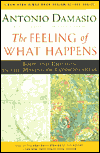Ye Olde Natural Philosophy Discussion Group
Reviews and comments on
Antonio Damasio: The Feeling of What Happens:
Body and Emotion in the Making of Consciousness [1999]

With a couple strenuous exceptions, the general feeling of our group was that this
was a mediocre book and a bit of a disappointment. Rosie said she enjoyed the book
to around page 157, but not thereafter. John agreed with Rosie, saying that he felt
the book included a lot of gobbledygook with some interesting points interspersed.
Kirby thought the theory of consciousness that Damasio presents is on the right
track, and would rate it higher if it had been better edited. He grew bored with it.
Kevin S. was so bored with it that he stopped reading after chapter one.
Jim read it a long time before the rest of us, and said he had forgotten much
of it—which in itself is something of a criticism (since it wasn't good enough to
stick in his memory). Being an MD, Jim didn't have the difficulties many of the
rest of us had with all the details about brain anatomy that fill the book. However,
Jim thinks that really understanding what consciousness is is a very difficult thing
to do, and perhaps only someone with an IQ of 160 or more might reasonably attempt
it. Kirby and Scott disagreed with that point, however, and believe that we ordinary
mortals can understand the nature of consciousness.
Kay thought that there was some good stuff in the book, but became bored with
it and angry that she had to read it!
Barbara and Scott, however, had much more positive opinions of the book.
Barbara said she read it with zest and vim, and enjoyed learning a lot about the
anatomy of the brain.
Scott thinks that the book is important and that its central thesis is even
rather profound. He sees it as indispensable for anyone seriously trying to get a
handle on what consciousness is all about.
Several people criticized the book for not "building the presentation" from
chapter to chapter. But Scott felt that this came from the fact that Damasio was
presenting various quite different types of arguments and evidence for his theory
in the different chapters. The thing that unifies the book is the central theory
of consciousness that he is putting forward, and all the chapters do serve to
explicate and support that theory, in one way or another.
Scott thinks that many of the points Damasio presents are essential to
understanding the nature of consciousness, including the concept of the proto-self
(in which the body unconsciously monitors its status), and the critical concept
of having a second order "map" (or representation) of the organism and its
relationship to an object which it is conscious of. Likewise the notions
of "core consciousness" and "extended consciousness" seem both valid and important.
Less convincing, Scott thinks, is the claim that consciousness itself is a "feeling
of what happens". Why is consciousness not simply a recognition of the
relationship between the organism and the "object"?
Damasio does not connect up his theory of consciousness with any of those
which have gone before. It seems to Scott that many of its key elements were at
least being grasped at earlier. In the milieu of artificial intelligence research,
for example, a popular theory of consciousness is that it consists of having both
an internal model of the world, and an internal self-model (of both your body
and your mind). Damasio does improve and expand on this in a number of ways, such
as by stressing the need to have an internal representation ("model") of your own
self before you can even be truly and fully conscious of some external
object. But Scott's view is that, despite its importance, Damasio's theory is not
the totally new theory that he seems to think it is. Still, no one seems to have
elaborated the theory as well as Damasio has, nor connected it up to proven or
postulated brain regions to the degree he has.
Despite the criticisms, our group average for the book, on a scale of 0 to 10,
was still a respectable 6.1.
Return to our complete list of books.
Return to our Science Group home page.
